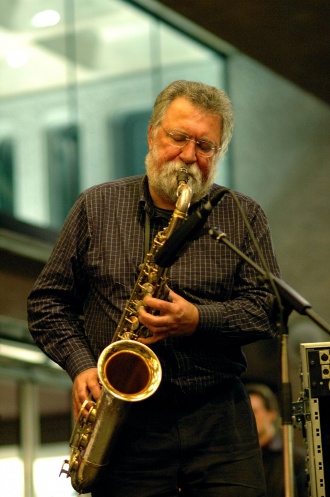This is the last article you can read this month
You can read more article this month
You can read more articles this month
Sorry your limit is up for this month
Reset on:
Please help support the Morning Star by subscribing here
KARYOBIN are imaginary birds said to live in paradise and it's also the title of a1968 recording, now reissued, which went on to become a free-jazz classic.

The quintet who made the album were drummer John Stevens, bassist Dave Holland, guitarist Derek Bailey, trumpeter and flugelhornist Kenny Wheeler and Evan Parker, one of the truly powerful and original jazz horn players.
They were members of the Spontaneous Music Ensemble, a group of frequently changing musicians who became pioneers of free improvisation in Britain and, listening to the album again, you can only marvel at the beauty of its sonic exploration, free lyricism and astonishing musicianship.
“That completely open approach to improvising was relatively new,” Parker says of the recording. “It was the first ‘official’ recording I was involved in and it remains an important part of my life. There was not much conversation afterwards, or at least nothing that I can remember. I feel more elated listening to it now than I did playing.”
He plays soprano saxophone on Karyobin and remembers how he heard John Coltrane — “my inspiration” — playing My Favourite Things in concert on soprano sax in 1963. “I also knew Steve Lacy’s soprano work with Gil Evans and Cecil Taylor, and between them they were my influences on the instrument.”
Parker remembers that percussionist Stevens was “the visionary who believed that we could simply listen and interact. Of course, the absence of ‘themes’ and chorus structures was a break in the convention of modern jazz up to that point.”
I ask what he thinks of his bandmates’ contribution to Karyobin and his answer is short and to the point: “Stevens: vision, Parker: intuition, Bailey: instrumental skill, Holland: generosity, Wheeler: musical genius!”
Warm, unselfish and a skilful organiser, Stevens believed in music to provide the opportunity for self-development. “It’s another little life in which it’s easier to develop the art of giving, an art that makes you more joyous the more you practise it,” he once said.
They are “honest and prophetic” words, says Parker. “I praise John to the skies at every opportunity.”
There was little money to be made from the audacious music they played, but “nobody was starving,” Parker says. “They were times of relatively cheap rents and cheap food. We were lucky to be living in that era of postwar Labour government reforms.
“It must be very different for young musicians starting out in London now. I have no idea how they do it.”
Even so, when asked if he's optimistic half a century after Karyobin, he's pretty upbeat. “Hope springs eternal,” Parker says. “These are complex times politically and socially, but the grotesque levels of inequality have to be addressed.
“Reforming the banking system would be a good place to start!”
Karyobin is released on the Emanem label.











